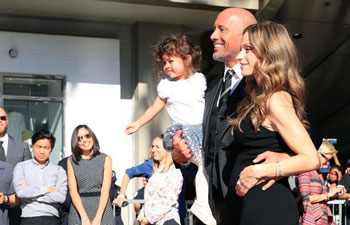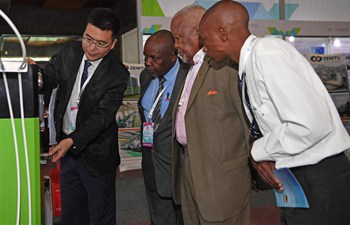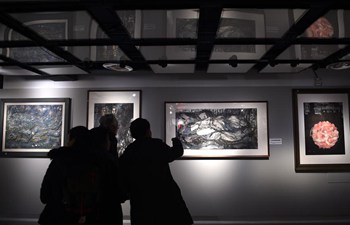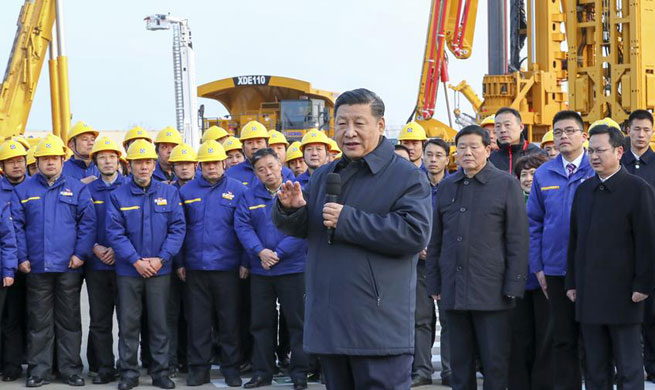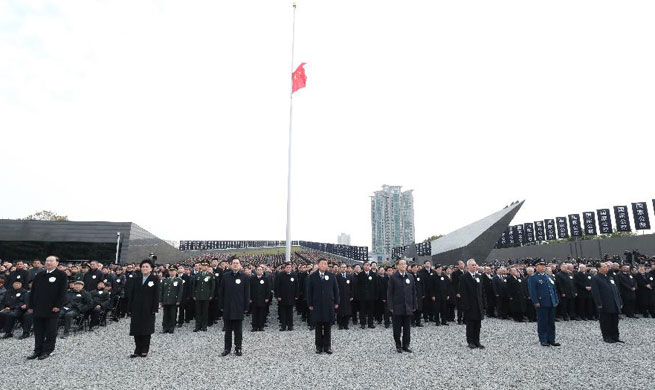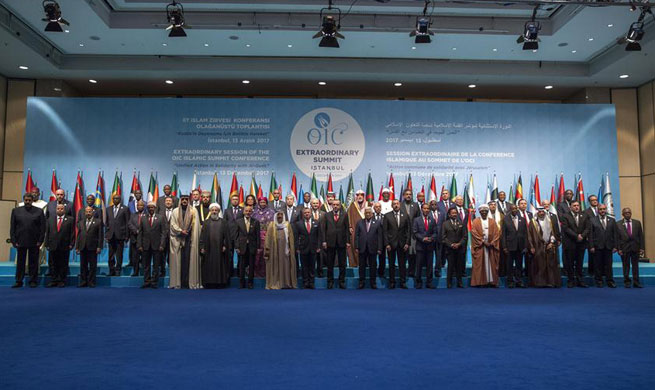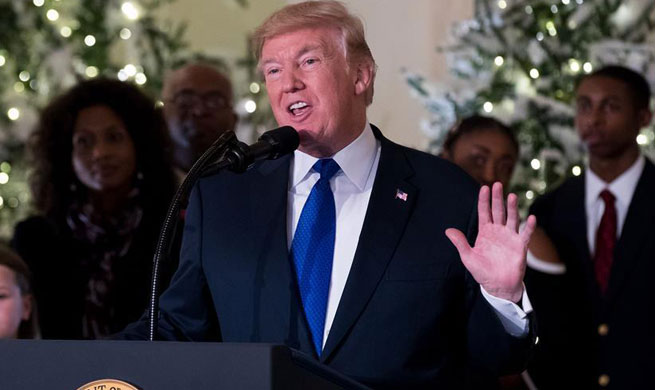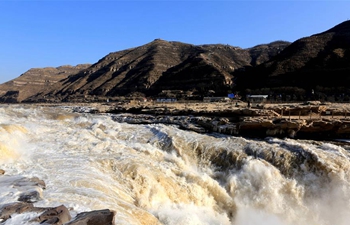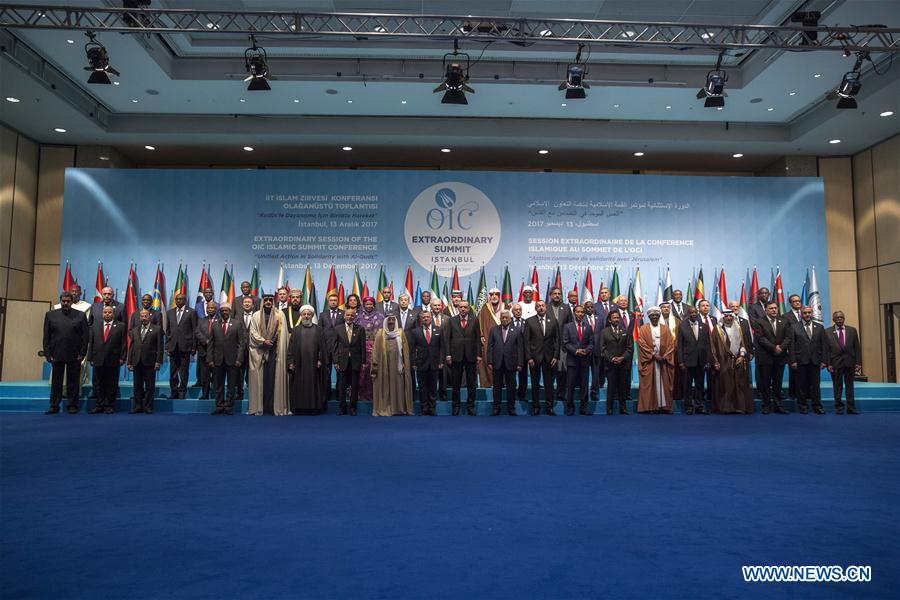
Participants pose for a group photo during the extraordinary summit of the Organization of Islamic Cooperation (OIC) in Istanbul, Turkey, on Dec. 13, 2017. Turkish President Recep Tayyip Erdogan on Wednesday urged the Islamic world to recognize Jerusalem as the capital of Palestine, while Palestinian President Mahmoud Abbas refused any U.S. involvement in the peace process. (Xinhua/Anadolu Agency)
ISTANBUL, Dec. 13 (Xinhua) -- Islamic countries on Wednesday showed solidarity to the world by declaring a series of steps to counter a U.S. decision to recognize Jerusalem as the capital of Israel, including discrediting Washington's role as a peace mediator, though they are seen as ones not easy to be implemented.
The one-day extraordinary summit of the Organization of Islamic Cooperation (OIC) in Istanbul was called by Turkish President Recep Tayyip Erdogan, whose country holds the rotating chair of the 57-member group, with a view to drawing up a roadmap for Muslim nations to follow as they oppose the unilateral U.S. decision on Jerusalem.
In his break with long-held U.S. practice on Dec. 6, President Donald Trump also decided to relocate the U.S. embassy from Tel Aviv to Jerusalem, whose status remains at the core of the intractable Israeli-Palestinian conflict.
For days, the U.S. move has sparked violent clashes in the Gaza Strip and the other Palestinian territory of West Bank under Israeli occupation, in addition to an unending outbreak of protests in other countries.
The OIC leaders hit back by declaring East Jerusalem as the capital of the State of Palestine, rejecting as "null and void" the U.S. decision and warning Washington of "all the consequences" of not retracting it and the risk of losing its role as a sponsor of the peace process, according to the draft final communique adopted at the conclusion of the summit.
In the view of Mehmet Seyfettin Erol, president of the Ankara Center for Crisis and Policy Studies, OIC countries are showing "one hundred percent unity" as well as a "very strong stance" against the United States by sending out a "strong message" in the final communique.
"This indicates a very significant split between the U.S. and the Islam world," he told Xinhua.
"Furthermore, declaring the U.S. as impartial and refusing its involvement in the future peace process as a mediator will also jeopardize the U.S. involvement as a superpower in other crises in the Middle East," he said, stressing that "this is diplomatically a very important message."
"The Islamic world has demonstrated strong unity with high-level participation," he said, adding "We can consider this as an awakening of the Muslim world."
Noticeably, Turkish Foreign Minister Mevlut Cavusoglu criticized some Arab countries for showing "very weak" response to Trump's move ahead of the OIC summit, declaring that "it seems some countries are very timid of the United States."
While attaching importance to the final communique highlighting the leaders' series of moves, Ilter Turan, a professor of international relations from Istanbul Bilgi University, sees them as ones "that cannot be implemented."
"Probably they will be remaining symbolic," he told Xinhua. "There may be a number of states who proceed to recognize the decision to have East Jerusalem as the capital of the Palestine State, but it will not necessarily change many things unless some countries that are not part of the OIC also proceed in the same direction."
He is not expecting such a scenario to emerge, saying "I think what we shall have is another sort of highly polarizing situation generated by the U.S. and the decision that only helps the consolidation of the polarization."
Trump's decision will make it rather difficult to wield more influence in the region, while some pro-U.S. governments will not be able to openly cooperate with Washington at least for a while due to the public being very upset about the Jerusalem issue, said the professor.
In his view, it is getting more difficult to restart the moribund Israeli-Palestinian peace process with the latest developments in the region.
In his article for the Hurriyet daily, Turkish writer Ahmet Hakan referred to a "Jerusalem fatigue" among Muslims, noting "The Middle East is already full of bloodshed that nobody can do anything about."
Barcin Yinanc, another columnist for the daily, wrote that "While entirely blaming the West for the Israeli seizure of Palestinian territories," President Erdogan did not refer to the fact that all this took place under the watch of Arab Muslims.
"The Arab world cannot take a unified stance without the consent of Saudi Arabia or Egypt," she wrote, noting the two countries currently harbor no nice feelings toward Ankara and they need U.S. support to maintain power and stand against Iran.




